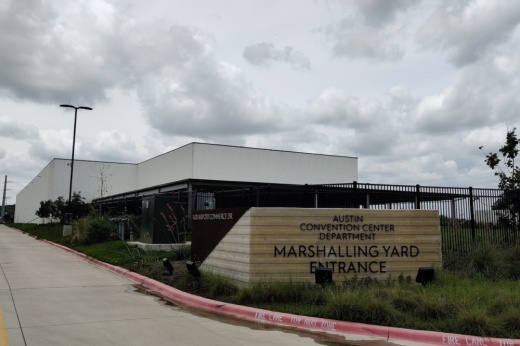A 300-bed homeless shelter will open in a municipal facility on the east side and two of the city's existing shelters will see their capacities increased as city leaders contend with Austin's persistent shortage of shelter and supportive housing spaces.
The details
The new shelter space with potentially hundreds of beds will be located at the Austin Convention Center's Marshalling Yard, a 70,000-square-foot facility on 34 acres of city-owned land at 1400 Airport Commerce Drive just off US 183 and Hwy. 71.
In a May 12 memo, Interim City Manager Jesús Garza said the convention center's off-site yard and warehouse will provide "up to" 300 temporary shelter beds for around one year.
Garza said Austin will use $9.14 million in federal pandemic relief funds reserved by City Council for homeless response to start up the facility. The new shelter space will be operated by a nonprofit to be selected through a city bidding process.
Separately, Garza announced that Austin's two bridge shelter facilities located off I-35, Northbridge and Southbridge, will have their capacities nearly doubled to accommodate 130 additional residents. The city will shift from single- to double-occupancy rooms to provide additional space.
The city bought the two former hotels in 2020, and the facilities have mainly served clients through Austin's Housing-focused Encampment Assistance Link program that has cleared away larger, high-priority encampments since 2021.
"Clearly, there is a critical need to increase shelter space. Austinites seeking to comply with reinstated local and state prohibitions on camping on public property urgently need a safe place to sleep," Garza said in the memo.
According to the Ending Community Homelessness Coalition, which manages regional homeless strategy, more than 4,500 people were experiencing unsheltered homelessness in Austin and Travis County as of April 2023 while 839 were sheltered—down from nearly 1,000 as of last September.
In an email, an ECHO spokesperson said Austin is currently facing a "dire" need for more shelter space, especially after the closure of downtown's now-shuttered Salvation Army shelter and its 100 beds.
The spokesperson said the nonprofit is "encouraged" by the city's move, while noting more community feedback should be worked in as the new facility comes online and more housing overall is still needed in the area.
"As people living outside continue to face the threat of encampment raids and arrests, our community needs more options for people to find immediate refuge. Places where people can find safety and get access to other services they might need are vitally important in communities that criminalize homelessness," he said. "Emergency shelter does not end someone’s homelessness. People staying in shelters are still experiencing homelessness. Housing ends homelessness, and any shelter system must focus on connecting people to long-term housing options paired with supportive services."
Zooming out
The Marshalling Yard space could be followed by other short-term shelter options. While the city works to grow its permanent shelter capacity, Garza said "one or more" temporary facilities will be set up.
Garza also said that Austin's Homeless Strategy Division plan to share comprehensive recommendations for the future of the local shelter network in June following a systemwide assessment.
In addition to the shorter-term shelter updates, city staff are also anticipating the opening of several new permanent supportive housing projects for homeless residents including:
- The 171-unit Espero Rutland project in North Austin, developed by Caritas of Austin and the Vecino Group, including 101 units for those exiting homelessness
- The 123-unit Balcones Terrace converted hotel in Northwest Austin, developed by Foundation Communities, including 50 supportive housing units
- The 78-unit Pecan Gardens converted hotel in Northwest Austin
- The 60-unit Bungalows at Century Park converted hotel in Northwest Austin
Alongside the announcement of the capacity increases, the Homeless Strategy Division will host three virtual meetings this week to share information on the new shelters and answer community members' questions.
“As a city, we remain committed to an approach that prioritizes reducing and ultimately ending homelessness in Austin. By working simultaneously on creating a continuum of support—from prevention to emergency shelter to permanent supportive housing—we can build a system that ensures homelessness in Austin is rare, brief and non-recurring for adults, youth and families in our community,” Garza said in a statement.
The meetings will be held:
- May 17 from 6-7 p.m. Register here.
- May 18 from 6-7 p.m. Register here.
- May 20 from 10-11 a.m. Register here.





